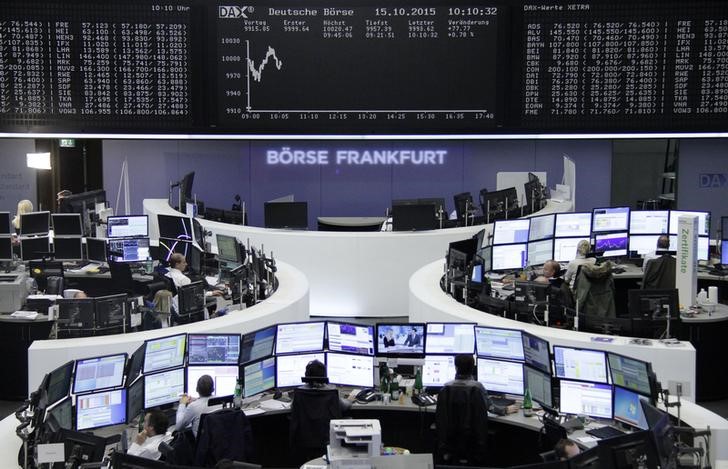By Alistair Smout
LONDON (Reuters) - Europe extended a global share market rebound on Friday, following Asian and U.S. stock indexes higher after stronger U.S. data helped allay fears about global growth and sent world stocks to two-month highs.
The pan-European FTSEurofirst 300 (FTEU3) rose 0.9 percent, up for a second straight session to recoup losses made earlier in the week after weak data from China.
That helped the MSCI World Index <.WORLD> to its highest level since Aug. 21. Up 6 percent so far in October, it is set for its best month since 2011.
Asian and European shares followed Wall Street higher after new applications for unemployment benefits fell back to a 42-year low last week. That suggested the labour market remained strong even though recent jobs data releases have sent mixed signals.
Core inflation data also showed some signs that price pressures are beginning to build up again, although the Fed has been in no rush to raise rates, expressing concerns that the slowing global economy, particularly in China, might pose a threat to the U.S. economic outlook.
"(The) report should be reassuring to markets which have been on edge over global disinflation risks," strategists at BNP Paribas (PA:BNPP) said in a note.
"It helps keep the possibility of a (interest rate) move at the end of this year alive, although our central scenario remains for a delay until at least March 2016."
Rekindled rate-hike expectations lifted the dollar. The dollar index (DXY), which values the greenback against a basket of six major counterparts, was up 0.3 percent at 94.681.
The dollar rose 0.2 percent to buy 119.08 yen
The data and the stronger dollar pushed gold into retreat from a 3-1/2-month high.
U.S. futures (ESc1) were roughly flat, anticipating earnings from the likes of General Electric (N:GE) and Honeywell (N:HON). With 10 percent of S&P 500 companies having reported quarterly earnings, 78 percent have beaten or met expectations, according to Thomson Starmine data.
Chinese stocks rose to seven-week highs, pushing main indexes to their strongest weekly performance in four-and-a-half months after data showed Chinese loans surged in September.
MSCI's broadest index of Asia-Pacific shares outside Japan (MIAPJ0000PUS) edged 0.2 percent higher and Japan's Nikkei stock index (N225) was up 1.1 percent.
Investors remained cautious before data on Monday that is forecast to show the world's second-largest economy slowing to a 6.5 percent growth pace in the third quarter, falling below 7 percent for the first time since the global financial crisis.
Annual inflation in the euro zone turned negative in September due to sharply lower energy prices, data confirmed on Friday, maintaining pressure on the European Central Bank to increase its asset purchases to boost prices.
The latest Reuters survey of over 60 economists showed euro zone inflation averaging 0.1 percent this year, rising to 1.1 percent in 2016 and 1.6 percent in 2017 -- still below the ECB's just under 2 percent target.
"The medium-term prognosis is probably as weak as it has been since (ECB President Mario) Draghi started QE," said Simon French, chief economist at Panmure Gordon, adding that recent euro strength had complicated his task further.
The euro was slightly lower at $1.1364
Spain's government bond yields fell as expectations mounted that Moody's will upgrade its credit rating.
London copper eased from near a one-month peak on Friday and was set to close the week of a major metals industry gathering little changed as incremental cuts to mine supply failed to revive prices given weak demand.
Oil prices snapped a week-long decline that pushed prices down nearly 10 percent, with some investors pinning hopes on forecasts of falling U.S. shale oil production.

U.S. crude (CLc1) was up 1.3 percent at $46.98 a barrel, after shedding 0.6 percent on Thursday. Brent (LCOc1) added 0.9 percent to $50.17.